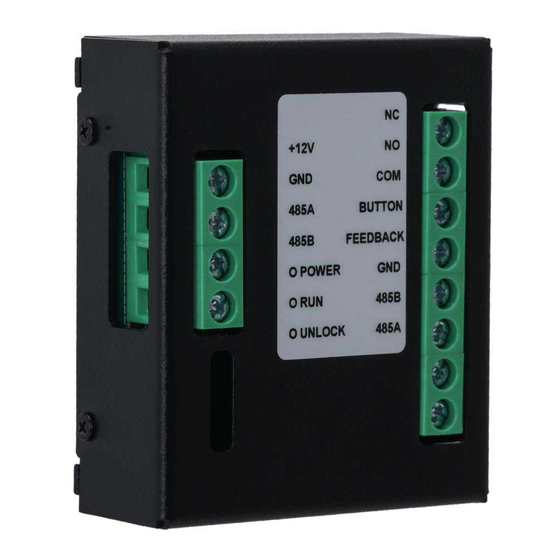
Table of Contents
Advertisement
Quick Links
Advertisement
Table of Contents

Summary of Contents for Dahua DHI-DEE1010B-S2
- Page 1 Access Control Extension Module User's Manual V1.0.0...
-
Page 2: Foreword
Foreword General This manual introduces the functions, networking and FAQ of the Access Control Extension Module (hereinafter referred to as "the Extension Module"). Read carefully before using the device, and keep the manual safe for future reference. Safety Instructions The following signal words might appear in the manual. Signal Words Meaning Indicates a high potential hazard which, if not avoided, will result in... - Page 3 might result in some differences appearing between the actual product and the manual. Please contact customer service for the latest program and supplementary documentation. ● There might be errors in the print or deviations in the description of the functions, operations and technical data.
-
Page 4: Important Safeguards And Warnings
Important Safeguards and Warnings This section introduces content covering the proper handling of the Extension Module, hazard prevention, and prevention of property damage. Read carefully before using the Extension Module, and comply with the guidelines when using it. Transportation Requirement Transport, use and store the Extension Module under allowed humidity and temperature conditions. - Page 5 ● Operate the Extension Module within the rated range of power input and output. ● Use the Extension Module under allowed humidity and temperature conditions. ● Do not drop or splash liquid onto the Extension Module, and make sure that there is no object filled with liquid on the Extension Module to prevent liquid from flowing into it.
-
Page 6: Table Of Contents
Table of Contents Foreword ........................................I Important Safeguards and Warnings ............................III 1 Product Introduction ..................................1 1.1 Product Overview ..................................1 1.2 Networking Diagram ................................1 2 Ports Description ....................................2 3 FAQ ..........................................3 4 Packing List ......................................4 Appendix 1 Cybersecurity Recommendations .......................... -
Page 7: Product Introduction
1 Product Introduction 1.1 Product Overview The Access Control Extension Module can work with the access control terminal or door station. The Extension Module communicates with the access control terminal or door station through RS-485 BUS, and connects with door detector, exit button, card reader and lock. The Extension Module transmits card information, door open information and alarms to the access control terminal or door station, improving the access control security. -
Page 8: Ports Description
2 Ports Description Figure 2-1 Ports... -
Page 9: Faq
3 FAQ 1: The door can not open when I swipe card. ● Check the card information on the management platfrom. Your card might be expired or not authorized, or card swiping is only allowed in the defined time schedules. ●... -
Page 10: Packing List
4 Packing List Check the items in the packaging box according to the packing list. Table 4-1 Packing list Item Quantity Access control extension module User's manual... -
Page 11: Appendix 1 Cybersecurity Recommendations
Appendix 1 Cybersecurity Recommendations Mandatory actions to be taken for basic equipment network security: 1. Use Strong Passwords Please refer to the following suggestions to set passwords: ● The length should not be less than 8 characters. ● Include at least two types of characters; character types include upper and lower case letters, numbers and symbols. - Page 12 reducing the risk of ARP spoofing. 8. Assign Accounts and Privileges Reasonably According to business and management requirements, reasonably add users and assign a minimum set of permissions to them. 9. Disable Unnecessary Services and Choose Secure Modes If not needed, it is recommended to turn off some services such as SNMP, SMTP, UPnP, etc., to reduce risks.














Need help?
Do you have a question about the DHI-DEE1010B-S2 and is the answer not in the manual?
Questions and answers